The Bvlgari Bvlgari Aluminium GMT (Live Pics & Price)
The Aluminium collection earns its wings.
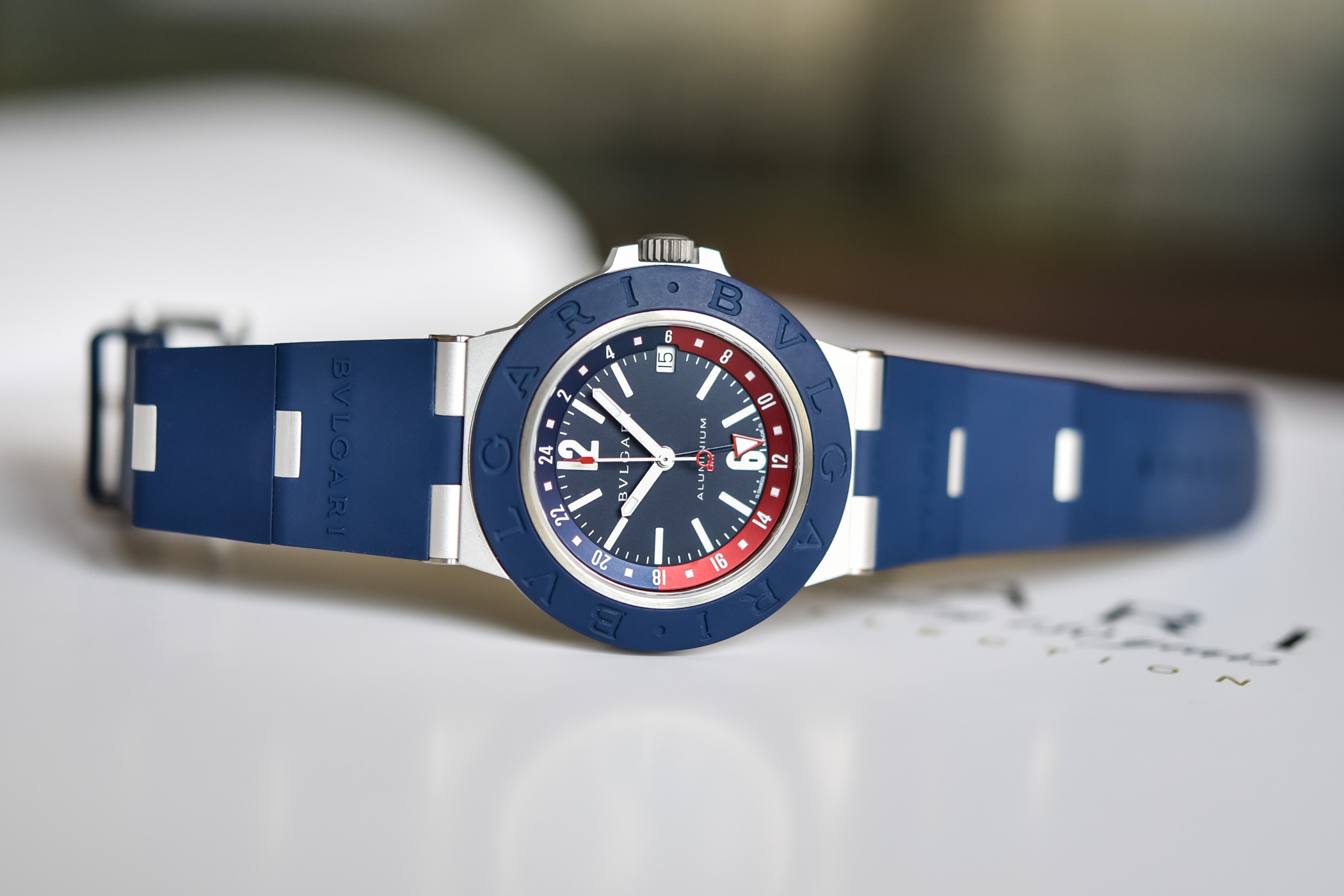
Slowly but surely, lockdowns are being eased. The prospect of travel is back on the agenda, which in our watch community is synonymous with GMT and world time watches. Scheduled for launch in September, Bvlgari introduces a GMT version of its Bvlgari Bvlgari Aluminium watch decked out in a crisp navy blue, red and white uniform. Following the welcome revival of the Aluminium last year, this new GMT fleshes out the collection and joins the automatic time-and-date and the chronograph models presented during Geneva Watch Days 2020. Following suit, the latest Aluminium watch is pitched as an entry-level model and hopes to catch the eye of the next generation of Bvlgari fans.
With seven world records for its ultra-thin Octo Finissimo watches attained in just seven years, Bvlgari’s role as one of the most innovative and exciting watchmakers on the scene today is incontestable. Beyond the watchmaking prowess displayed in these lean mechanical marvels, Bvlgari has always known how to seduce the crowds with its captivating Italian style.
Brief Background
Although women’s jewellery watches had been part of Bvlgari’s portfolio since 1918, the first gent’s watch to be produced on an industrial scale was the 1977 Bvlgari Bvlgari. A relatively simple time-and-date model, the standout feature of this watch was its gold bezel emblazoned with the brand name (not once, but twice), just like coins issued by Roman emperors with their portraits in the centre and their names on the periphery. A brazen bet, incorporating the brand name as a design element proved to be a massive hit. Following its wake, the Roman jeweller introduced the sporty Diagono chronograph in 1988, still emblazoned with the Bvlgari Bvlgari engraving on the dial.
Ten years later, and emboldened by the success of these heavily branded models, Bvlgari decided to push the envelope and experiment with a radical combination of aluminium and rubber for its Aluminio watch collection. Although rubber and aluminium might not strike us as being particularly vanguard nowadays, I can assure you that back in 1998, this mix was unconventional, to say the least. Although Hublot’s Italian founder Carlo Crocco shocked Baselworld 1980 with his gold watch and black rubber strap, Bvlgari went one step further and produced a case made from aluminium, a lightweight metal usually relegated to bezels.
Originally presented in three case sizes with quartz movements, the attractive Aluminio sports watch, with its unconventional materials and slick Italian design, appealed to both sexes. Part of the marketing campaign for the Bvlgari Aluminio included decking out an Alitalia Boeing 747 with an image of the watch literally strapped around the upper deck of the first-class cabin area.
During our video interview with Jean-Christophe Babin filmed last year at Geneva Watch Days, Bvlgari’s CEO explained that the revival of the Aluminium was, in part, a response to the “many clients (who) begged us to bring it back” and to the fact that “it continued to be a bestseller on the counterfeit market”. Fabrizio Buonamassa, Bvlgari’s genial creative director, was in charge of revamping the Aluminium without altering the signature design. As Babin points out, it was a head-to-toe job with “not one screw in common with the 1998 model”.
The 2020 Aluminium time-and-date and chronograph models featured the new 40mm case size, an increased water-resistance of 100m and ETA mechanical movements to keep the prices in check. Benefitting from advances in aluminium and rubber technology, the new Aluminium watches are sturdier case-wise, and the strap is softer and more resilient. The winning black and white colour scheme was a hit provoking nostalgia in older generations and interest among millennials who could get their hands on a cool Bvlgari sports watch at an entry-level price.
The new Bvlgari Bvlgari Aluminium GMT
The latest Aluminium GMT is exceptionally light and weighs just 68.6gm (aluminium is 75% lighter than steel and 40% lighter than titanium). The case measures 40mm and has a slim height of 9.70mm. Still water-resistant to 100 metres, with a titanium crown and caseback, so far, the Aluminium GMT is in line with the previous models. Although a lot of the aluminium is shielded by the imposing rubber bezel, you can appreciate its matte white radiance on the lugs and case sides, contrasting with the darker titanium crown.
However, the novelty on board this GMT is the bold red, white and blue colour scheme that is almost naval in inspiration. The thick rubber bezel, a key feature of the Aluminium’s identity, is blue and inscribed with Bvlgari Bvlgari. Moving from the periphery of the bezel towards the centre, the first element you encounter is the inclined 24-hour flange for the GMT hand. Picked out in blue and red anodised aluminium, the hour markers are white and extremely easy to read. The sloping flange rests on the matte, slightly grainy blue dial with thick, long white indices and bold Arabic numerals at 12 and 6 o’clock. In contrast, the circular counterbalance and tip of the central seconds hand and the arrow-shaped GMT hand are red. In a departure from the 2020 models, the GMT has a lot more Super-Luminova. Here the indices, the Arabic numerals at 12 and 6, the hour and minute hands, and the all-important GMT hand are liberally painted with Super-LumiNova. A date window at 3 o’clock with a white background and black numerals completes the functions on the dial.
The GMT complication offers home and local time at a glance and is extremely easy to consult and user friendly. Local time, indicated with the central hour and minute hands, and reference time, displayed with the red-tipped GMT hand against the 24-hour scale, are both set at the crown. Furthermore, there can be no confusion as to day or night thanks to the two-tone 24-hour scale.
Matching the bezel, the blue rubber strap features the brand name on the links closes to the articulated lugs. Each lug – there are only two – is separated by a central aluminium link before tapering towards the aluminium pin buckle. Thanks to the articulated ‘door hinge’ lugs, the watch sits snugly on the wrist, and its aluminium case offers insuperable lightness.
Classic Movement
Although the titanium caseback is sealed, the watch is powered by the B192 calibre based on a classic Sellita SW 330 (the GMT version of the SW 300). An automatic movement with a frequency of 28,800vph, it delivers a power reserve of 56 hours. As always with this movement, it’s the GMT hand that is adjusted by one-hour increments with the crown, and not the local-time hour hand.
Thoughts
Extremely comfortable on the wrist thanks to its lightweight aluminium case and latest-generation rubber strap, the red, white and blue colours of the GMT are louder than the previous models and right on trend with the comeback of 1980s fashion. The signature rubber bezel, which gives the watch its personality, looks good in blue, but the incorporation of the two-tone 24h flange compresses the dial space more than it used to be on the classic models of 2020. But still, it has yet again that playful, youthful style full of lightness that made the original Aluminium watch a hit.
Availability & Price
The Bvlgari Bvlgari Aluminium GMT (ref. 103554) will be launched in September during Geneva Watch Days. It will retail for EUR 3,500. For more information, please visit www.bulgari.com.


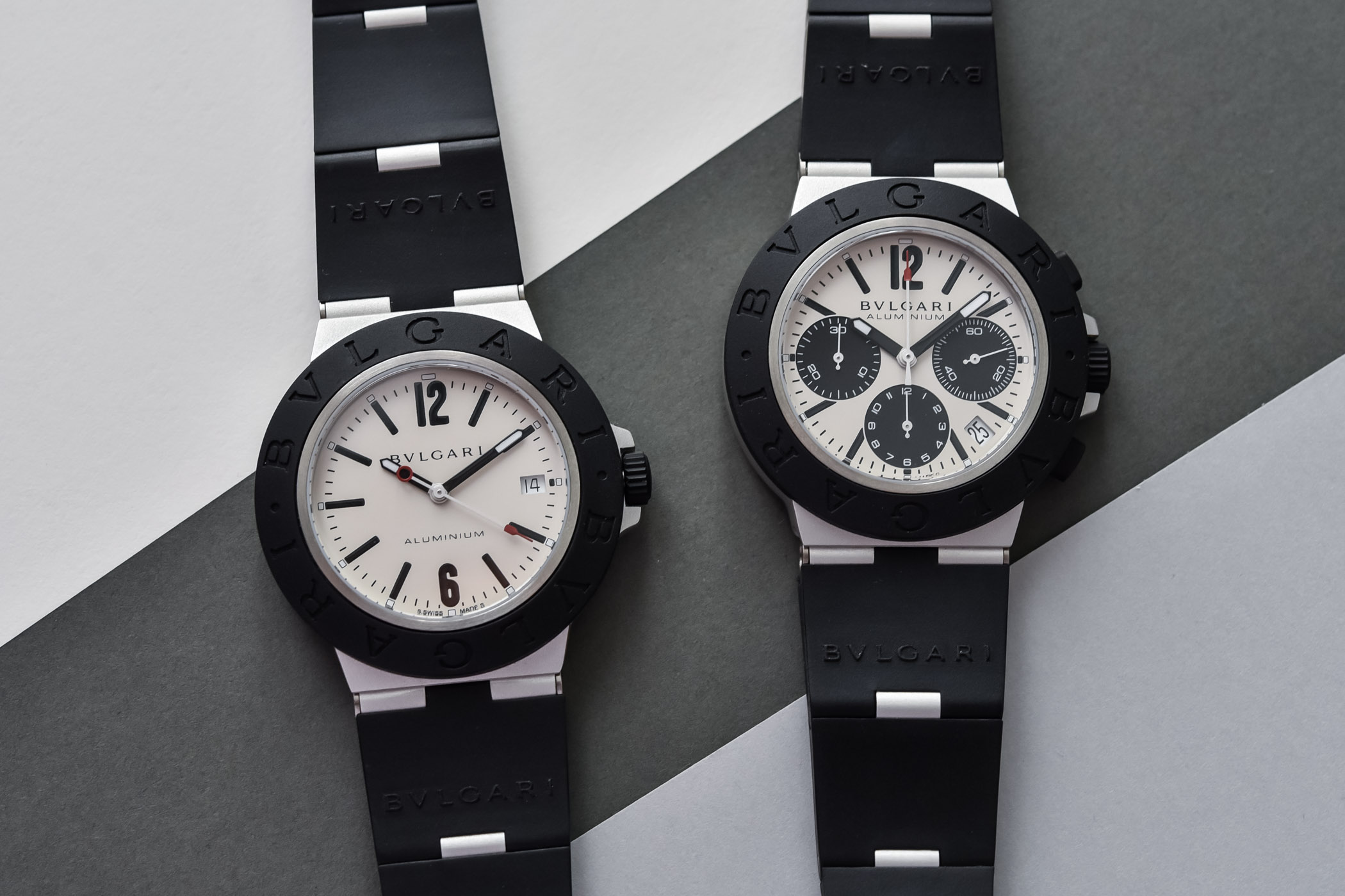
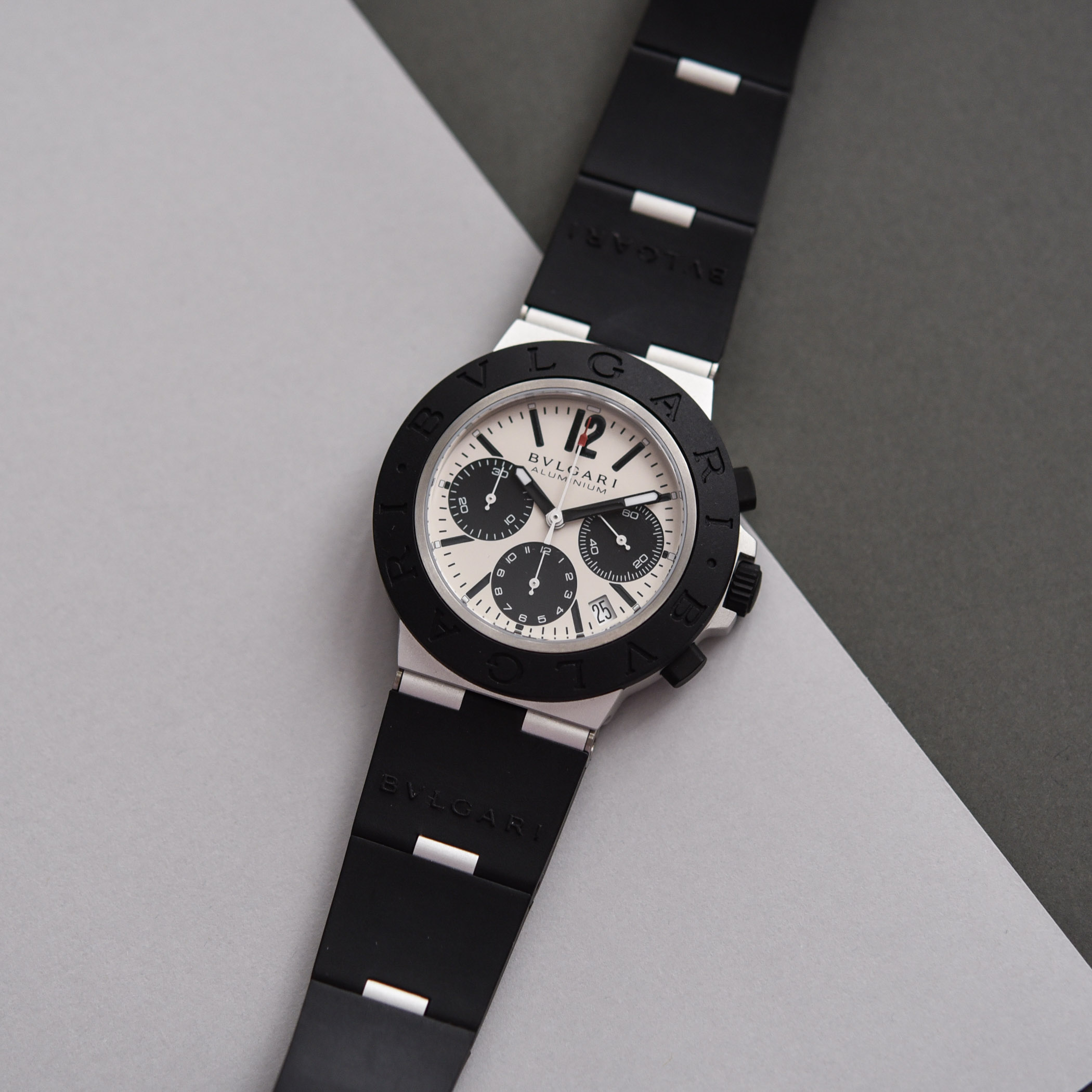
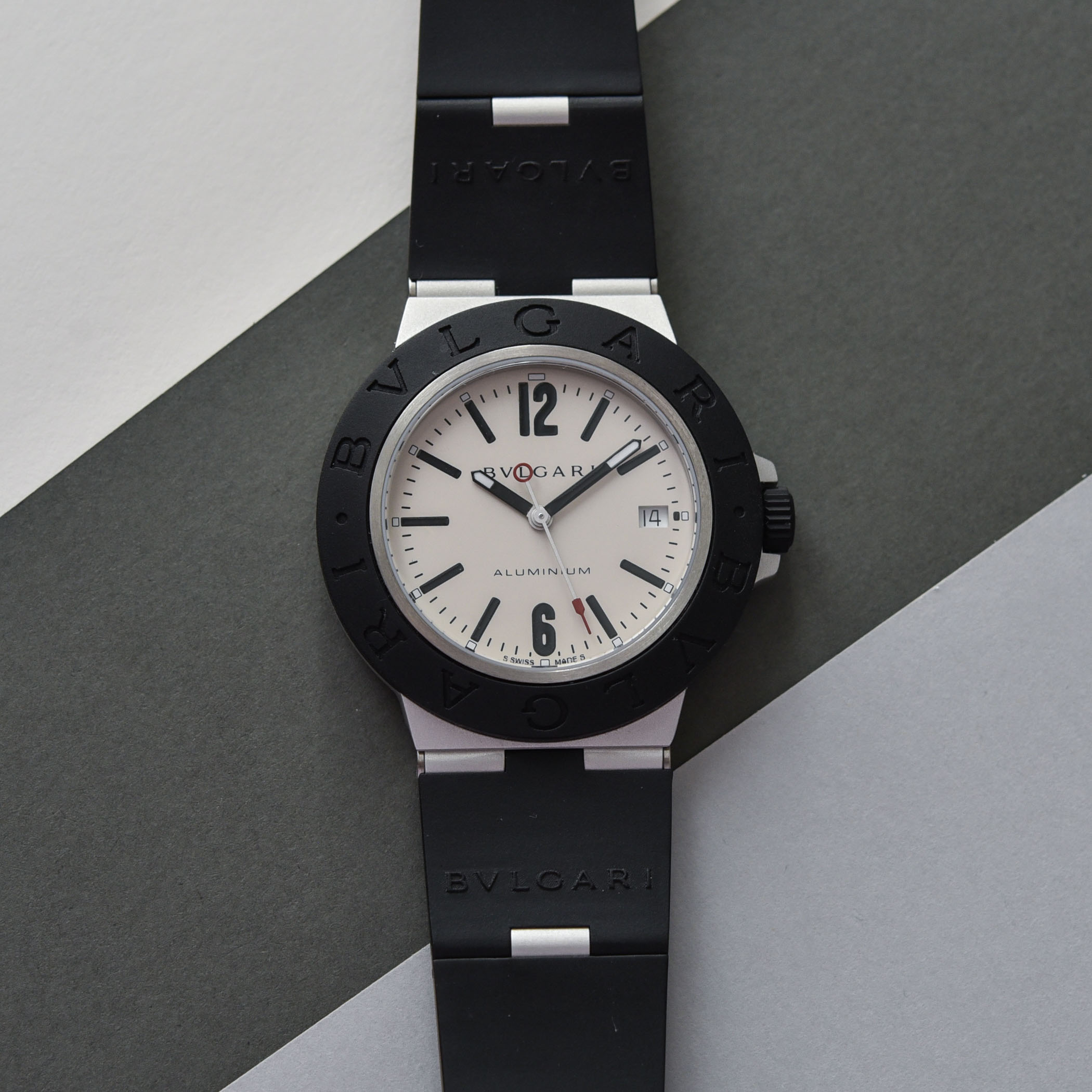
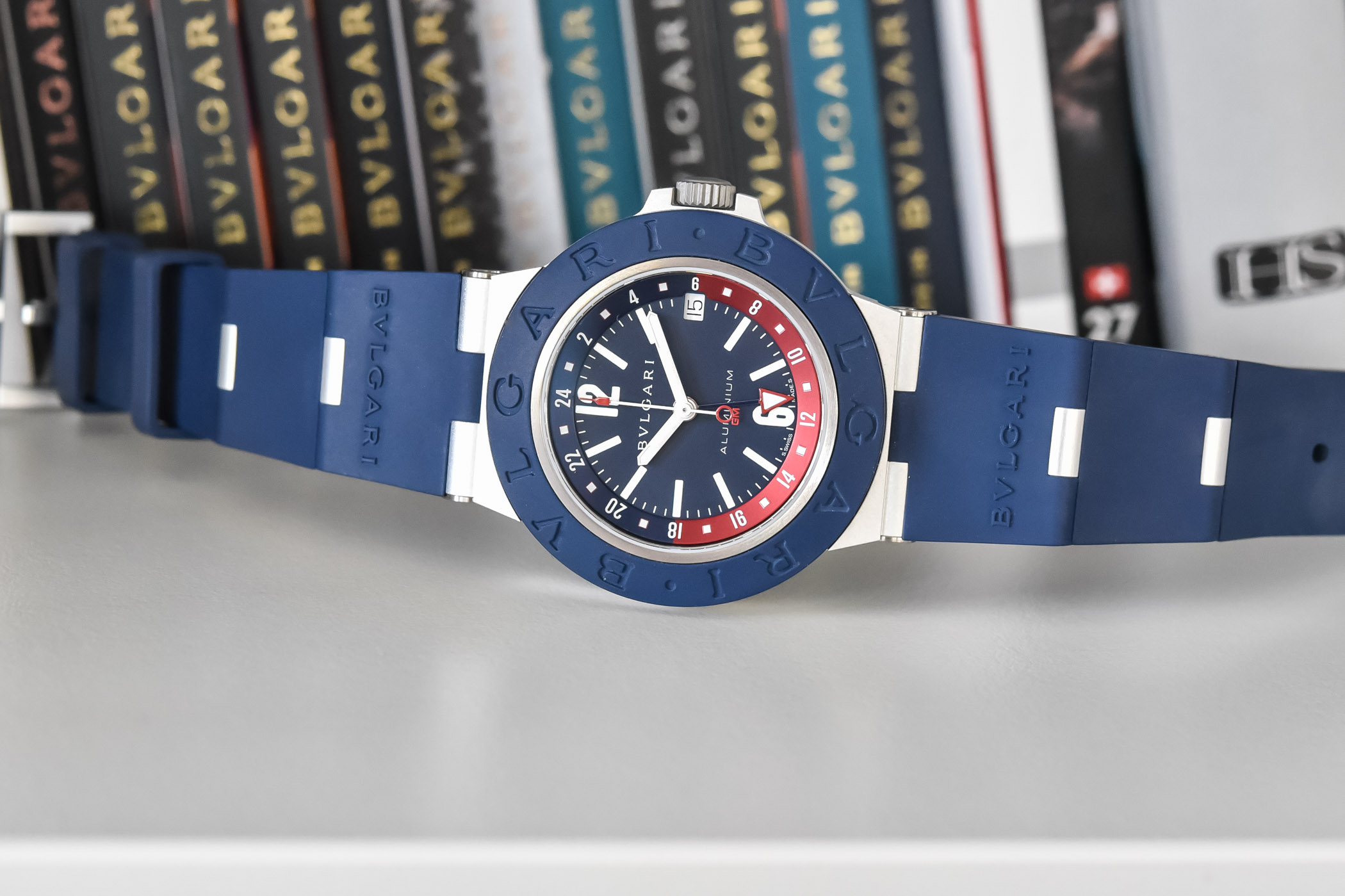
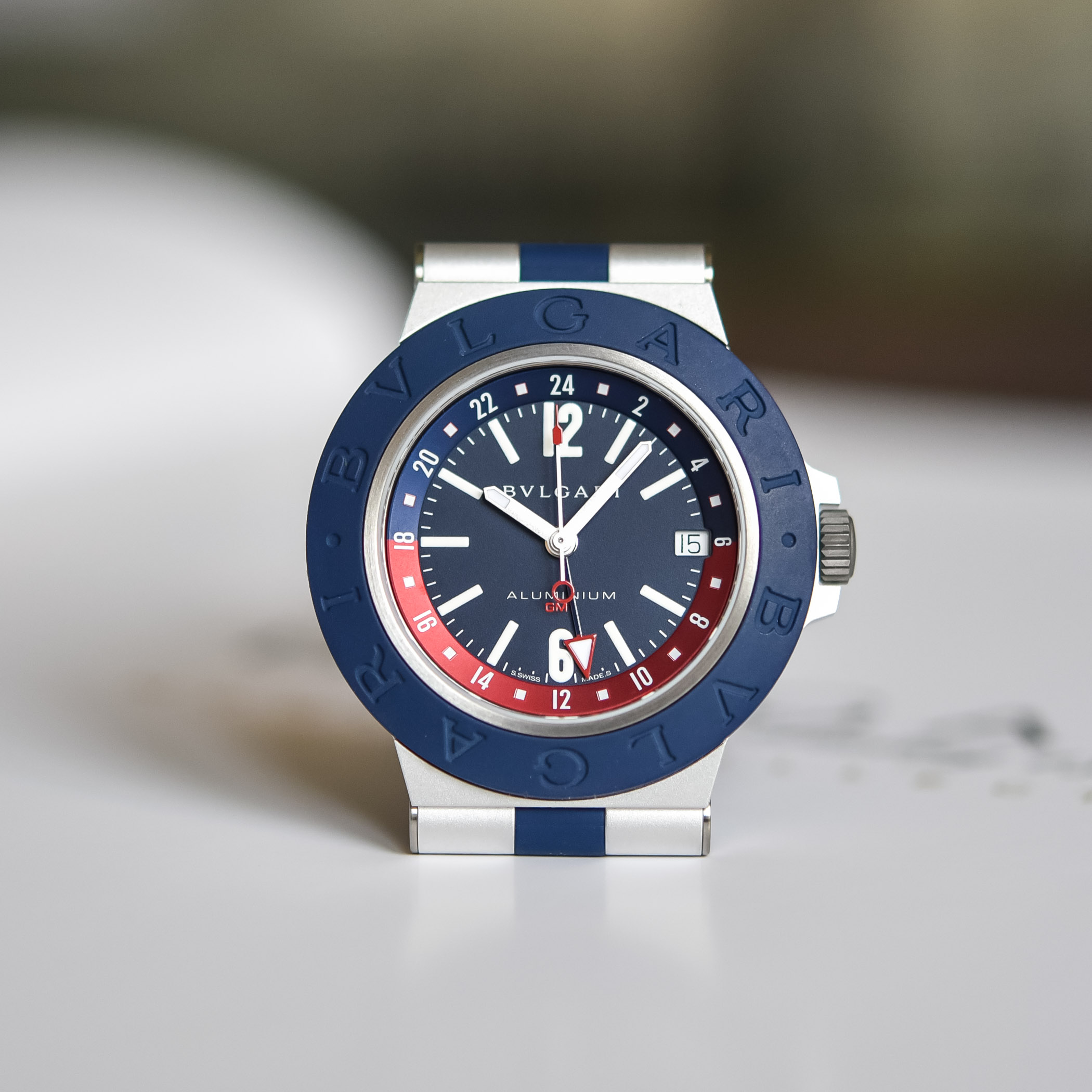
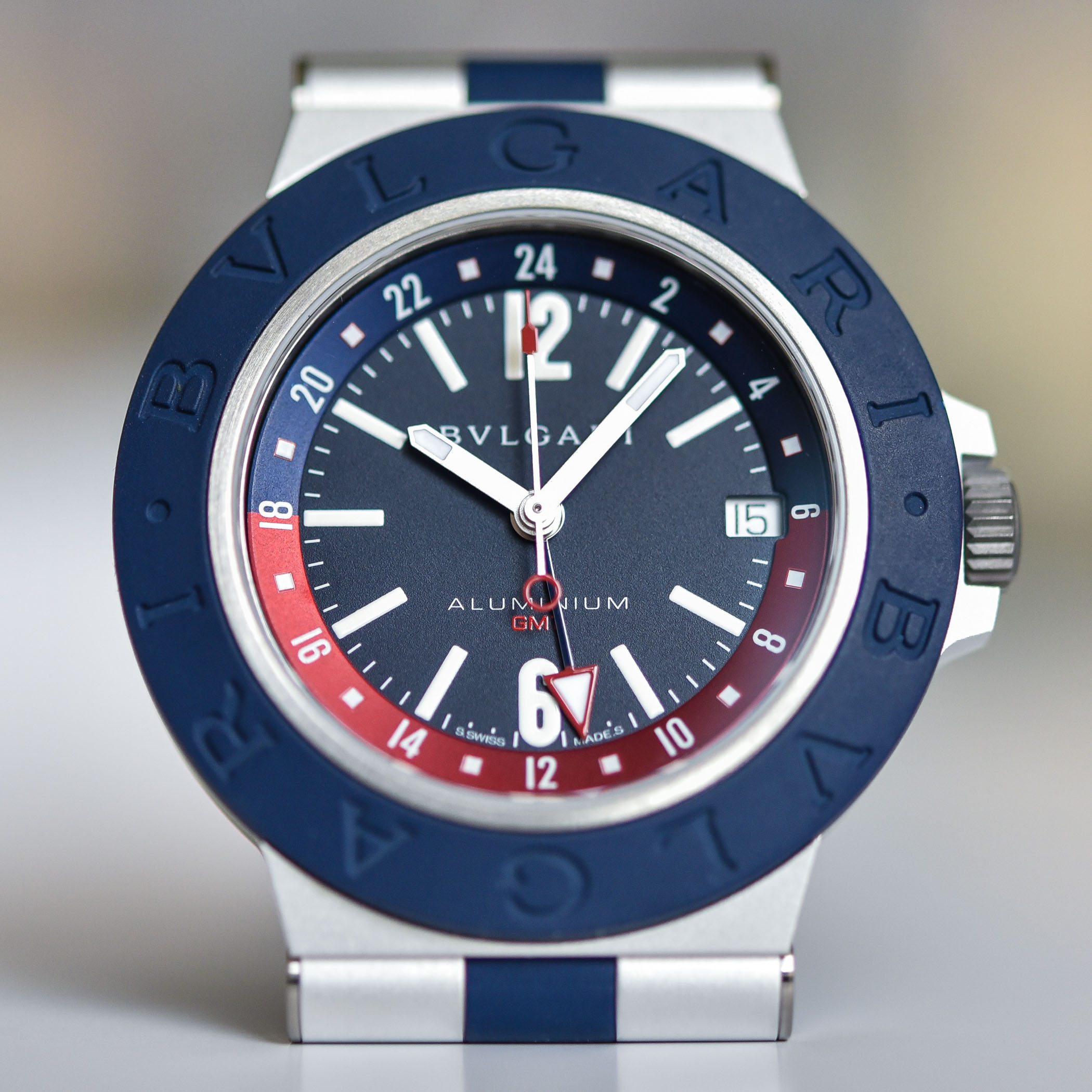
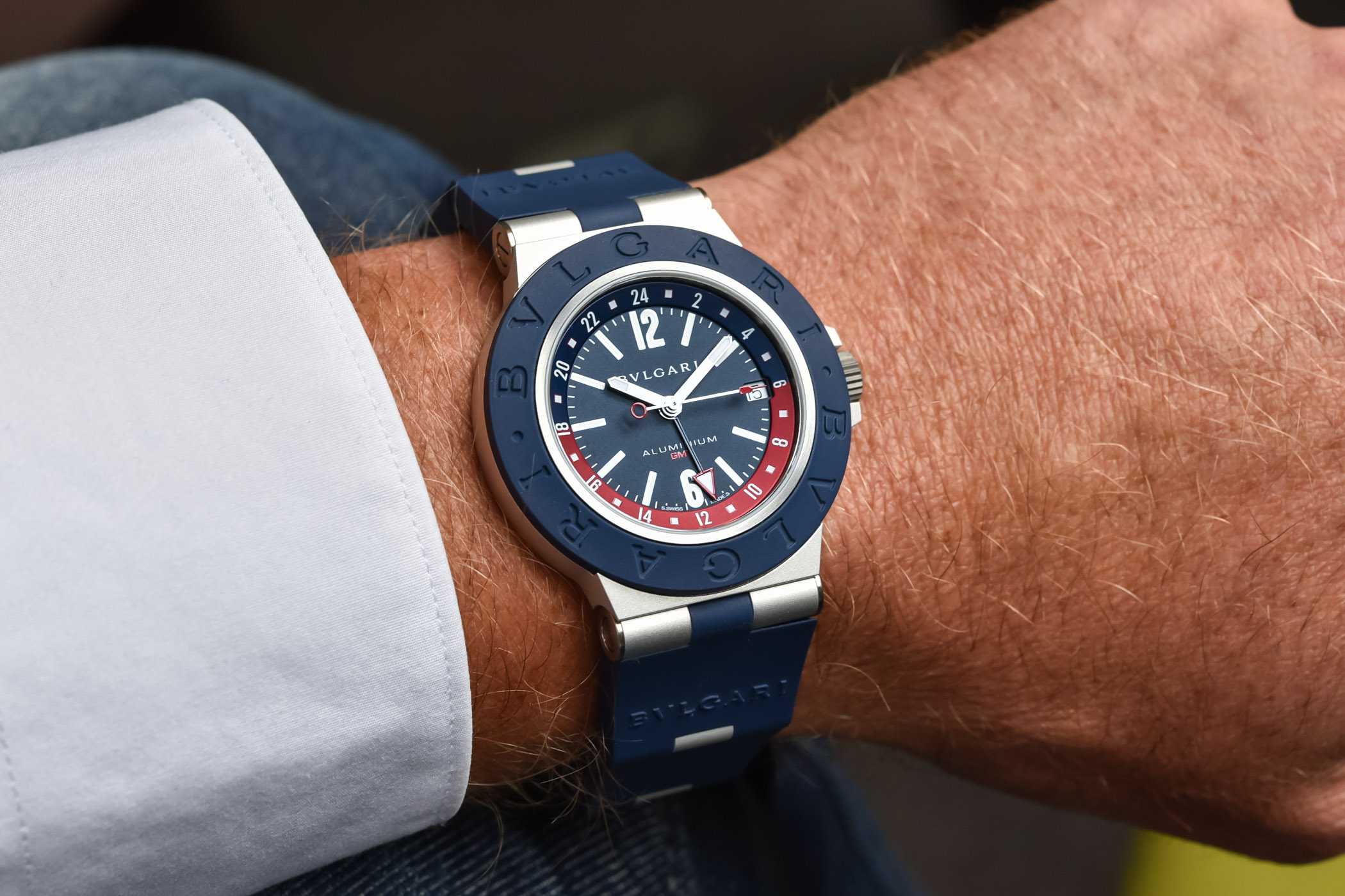
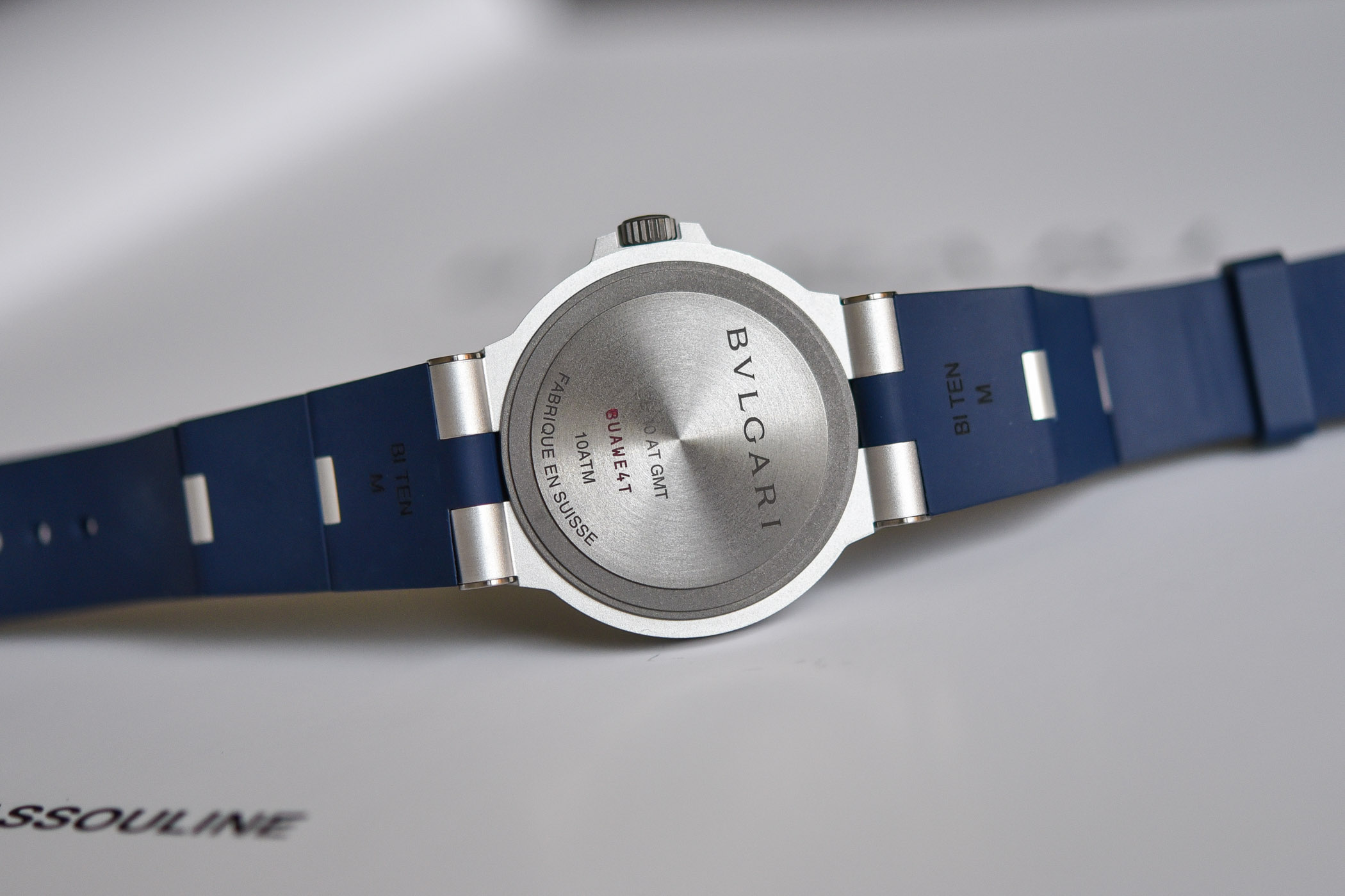
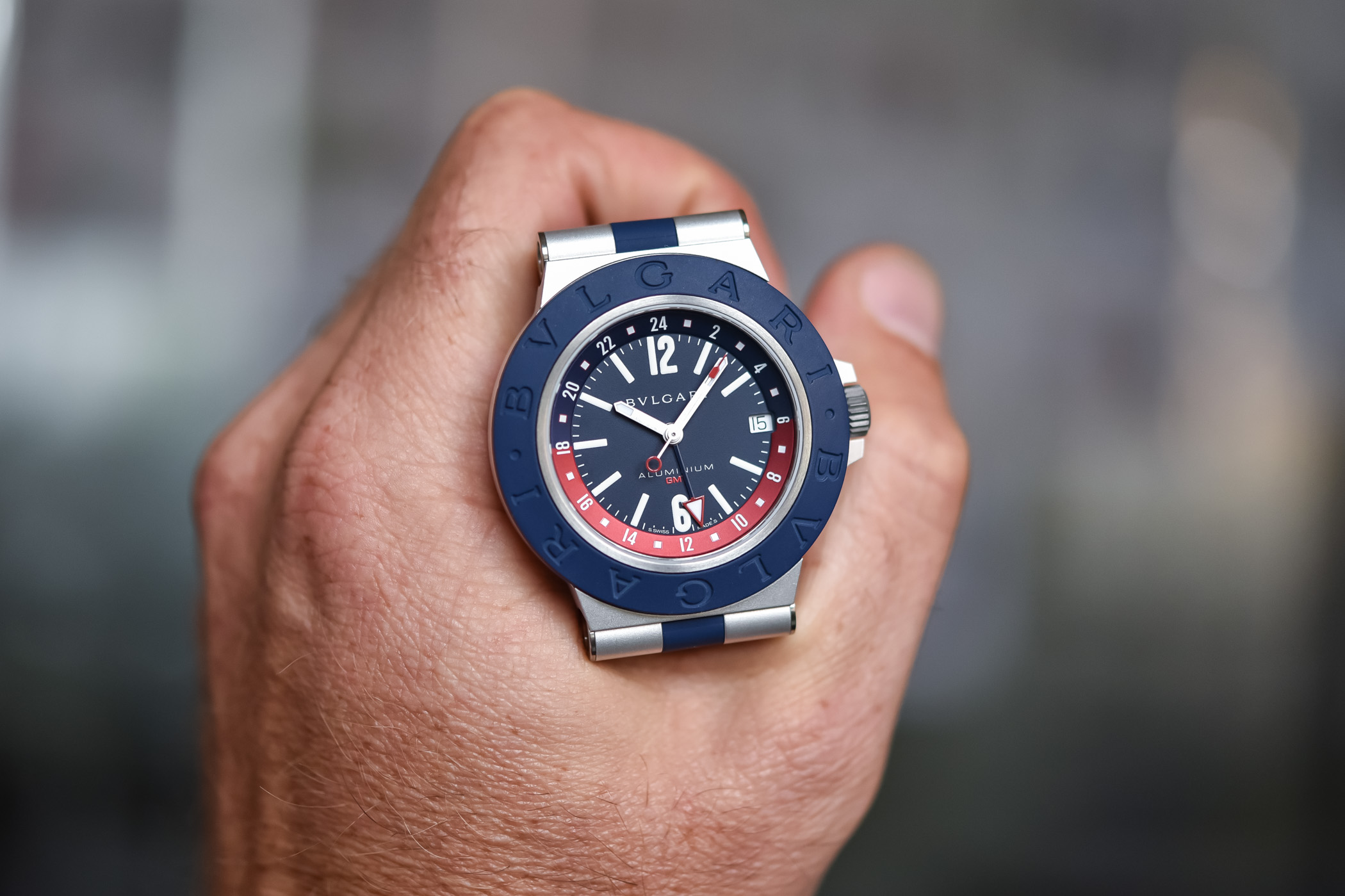



2 responses
Forgive my plain words but this watch is beyond hideous.
3500 Euros for an “Office” GMT is far too much, the Mido Ocean Star GMT as well as models from Tissot and Certina that use the C07.661 movement, which is a proper traveler’s GMT with an independently adjustable hour hand, are priced at around or just above 1000 Euros. Add this lack of a proper GMT function to the “questionable” aesthetics of this watch and it is hard to see how anyone other than a committed Bulgari fan would buy it.